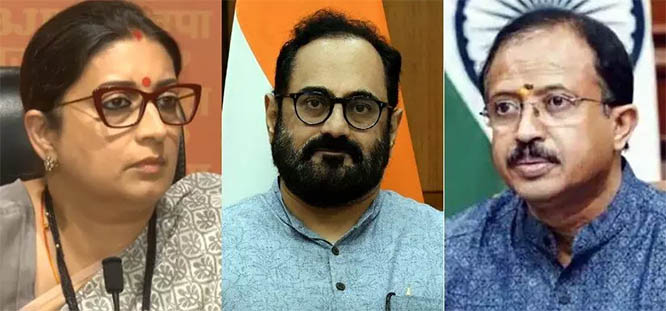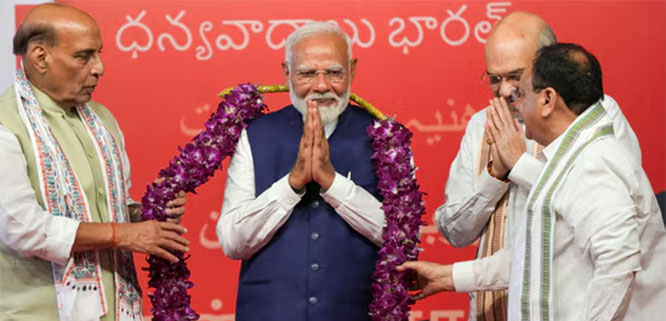BJP heavyweights Smriti Irani, Arjun Munda and Ajay Mishra Teni, among others, were unseated in the 2024 Lok Sabha elections. These losses, particularly in the Hindi heartland, have forced the BJP to lean on its NDA partners to form the government.
This marks a deviation from the sweeping mandates of 2014 and 2019, when the BJP garnered 282 and 303 seats respectively, achieving a majority on its own.
The Election Commission of India has declared the results for 542 out of the 543 Lok Sabha constituencies so far. The BJP has secured 240 seats, while the Indian National Congress trails with 99.
The Ones Who Lost
Smriti Irani: One of the most high-profile defeats was that of Smriti Irani in Amethi. Ms Irani, who had famously defeated Rahul Gandhi in 2019, lost to Congress candidate Kishori Lal Sharma by a margin of 1,67,196 votes. This defeat marked the end of an era in Amethi, which had briefly been a BJP bastion under Ms Irani's stewardship.
Ajay Mishra Teni: The Union Minister of State for Home Affairs, embroiled in the controversial Lakhimpur Kheri incident, was defeated by the Samajwadi Party's Utkarsh Verma by over 34,329 votes.
Arjun Munda: The Union Tribal Affairs Minister faced a crushing defeat in Jharkhand's Khunti constituency, losing to Congress candidate Kalicharan Munda by 1,49,675 votes.
Kailash Choudhary: In Rajasthan's Barmer, Minister of State for Agriculture and Farmers' Welfare, Kailash Choudhary, finished third, trailing by 4.48 lakh votes behind the victorious Ummeda Ram Beniwal of the Congress.
Rajeev Chandrasekhar: In Kerala's Thiruvananthapuram, the Union Minister of State for Electronics and Information Technology, Rajeev Chandrasekhar, lost to Congress stalwart Shashi Tharoor by over 16,077 votes.
The BJP's setbacks weren't limited to these prominent figures. Ministers such as Mahendra Nath Pandey, Kaushal Kishore, Sadhvi Niranjan Jyoti, Sanjeev Balyan, Rao Saheb Danve, RK Singh, V Muraleedharan, L Murugan, Subhas Sarkar and Nishith Pramanik also faced defeats in the polls.
Mahendra Nath Pandey, the Union Minister of Heavy Industries lost his Chandauli seat in Uttar Pradesh. Minister of State for Housing and Urban Affairs, Kaushal Kishore lost against Samajwadi Party's RK Chaudhary by 70,292 votes in Mohanlalganj.
Sadhvi Niranjan Jyoti, the Union Minister of State for Consumer Affairs, Food, and Public Distribution, lost in UP's Fatehpur. Rao Saheb Danve, the Minister of State for Railways, lost the Jalna seat in Maharashtra to Congress' Kalyan Vaijnath Rao Kale. Cabinet Minister Rk Singh lost to CPI(ML)'s Sudama Prasad from Bihar's Arrah.
Union Minister Sanjeev Balyan was defeated in the Muzaffarnagar Lok Sabha seat by Samajwadi Party's Harendra Singh Malik by a margin of over 24,000 votes.
V Muraleedharan, the Union Minister of State for External Affairs and Parliamentary Affairs, was defeated in Kerala's Thiruvananthapuram. L Murugan, the Minister of State for Fisheries, Animal Husbandry, and Dairying, lost to DMK's A Raja in Tamil Nadu's Nilgiris by a substantial margin of 2,40,585 votes.
Nishith Pramanik, the Union Minister of State for Home Affairs, lost the Cooch Behar seat in West Bengal to TMC's Jagadish Chandra Basunia by over 39,000 votes.
Minister of State for Education Subhas Sarkar was defeated by Trinamool Congress candidate Arup Chakraborty in the Bankura Lok Sabha seat of West Bengal by a margin of 32,778 votes.








Comments
Add new comment